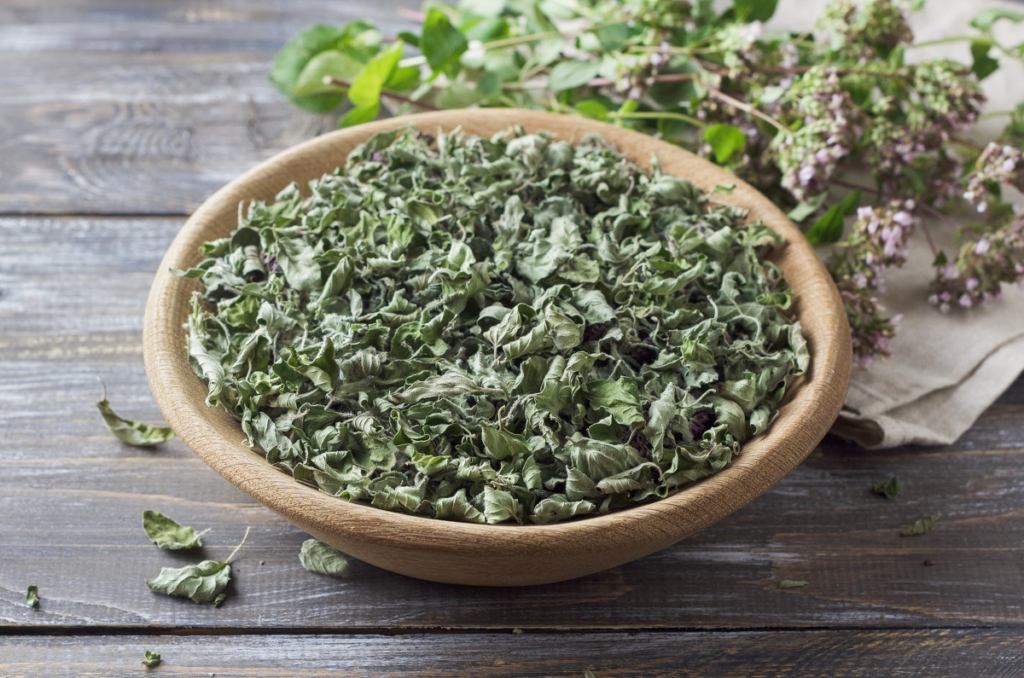Oregano derives its name from the Greek words “oros” (mountain) and “ganos” (joy), meaning “joy of the mountain.” Since ancient times, it has symbolized happiness and peace, while its medicinal properties have been well-documented and widely recognized. Oregano has been used to alleviate and treat a variety of conditions.

Health Benefits of Oregano & Oregano Oil
More specifically, oregano is known for:
- Treating fungal and yeast infections (e.g., athlete’s foot).
- Combating bacterial overgrowth (such as candida).
- Relieving symptoms of Small Intestinal Bacterial Overgrowth (SIBO).
- Fighting various infections.
- Helping eliminate parasites from the body.
- Reducing inflammation-related conditions (such as rheumatoid arthritis, sciatica, and Irritable Bowel Disease (IBD)) when applied topically.
- Providing antimicrobial action, which can help soothe sore throats caused by pharyngitis.
- Offering high antioxidant properties.
The Power of Oregano Oil
Oregano is widely used in essential oil form, extracted through distillation. Its remarkable health benefits are primarily attributed to phenols, such as carvacrol, a phenolic terpene. In fact, oregano oil contains 26 times more phenols than other sources, including fruits, tomatoes, tea, coffee, broccoli, potatoes, red wine, and soy. This makes it one of the most potent plant-derived antiseptics.
Carvacrol: The Super Phenol
According to scientific literature, carvacrol exhibits strong antibacterial, antioxidant, and anticancer properties. Its antimicrobial potency surpasses other volatile compounds found in essential oils, proving especially effective against foodborne pathogens like Escherichia coli, Salmonella, and Bacillus cereus. Additionally, its antioxidant properties are amplified when combined with thyme’s thymol.
Recent studies suggest that oregano oil can support human growth, immunity, and serve as a natural alternative to antibiotics.
Oregano: A Natural Antioxidant Powerhouse
A U.S. Department of Agriculture (USDA) study ranked oregano above all fruits and herbs in antioxidant activity. It contains:
- 42 times more antioxidants than apples
- 12 times more than oranges
- 4 times more than blueberries
These properties make oregano a powerful ally against free radicals, which contribute to Alzheimer’s disease and neurodegenerative disorders.
Additionally, oregano has been medicinally used for its astringent, expectorant, diaphoretic, and stomach-soothing effects, as well as for relieving colic, coughs, headaches, nervousness, and toothaches.
How to Make Oregano Oil at Home
Ingredients:
- 1 large bunch of dried oregano
- Extra virgin olive oil
- 1 glass jar
- 1 mixer
Instructions:
- Ensure the oregano is completely clean and dry (moisture promotes bacterial growth in the oil).
- Remove the leaves from the stems and place them in a jar.
- Use a muddler to crush the leaves, releasing their essential oils.
- Pour in the olive oil, ensuring all leaves are submerged.
- Store the jar in a cool, dark place for two weeks, stirring occasionally.
- After two weeks, strain the oil using a cloth or fine sieve and transfer it to a sealed jar.
- Refrigerate for extended shelf life (a few months). You’ll know it has expired when the oil develops a rancid smell.
How to Use Oregano Oil
Dosage:
- 3-5 drops, 1-2 times per day for up to 10 days per month.
- Pause for 20 days before resuming.
Ways to Consume It:
Due to its strong taste, you can mix it with:
- Bread or cheese
- Olive oil
- Salads, soups, and stews
- Herbal teas or natural fruit juices
Potential Side Effects of Oregano Oil
- Heartburn
- Stomach discomfort
- Skin irritation (if applied topically)
- Not recommended for pregnant women, as it may cause uterine contractions
Always consult a healthcare professional before use.
Ask me anything
Explore related questions





